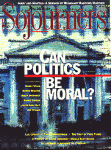Twentysomethings. The current shorthand for people in their 20s is especially fitting since it is a term derived from the title of the now-departed baby-boomer TV angst-fest, thirtysomething: People in their 20s are often defined almost solely in terms of the negative influence of television and unfavorable comparisons with baby-boomers.
In these scenarios, the generation of people currently in their 20s is portrayed as lacking ambition, moral depth, and interest in social activism. It's as though we were suckled en masse on The Brady Bunch reruns, weaned on MTV, and left with a universal case of cultural malnutrition--marked by short attention spans, materialism, and a generally shallow take on life. Somehow we never measure up to the '60s idealism of the early boomers or even the '80s career drive of the late boomers.
Twentysomething. Vague. Directionless. Insubstantial. Is this a full and accurate picture of a generation?
The funhouse mirrors (advertising, entertainment, media, information services) that reflect our image as a group or country too often stretch and distort out of the picture all elements that don't cluster around some (perhaps arbitrary) demographic center. Any attempt to define a generation is usually a middle-class and largely white affair. Minorities who aren't poverty-stricken and desperate are told they don't exist, as are the blue-collar and service-sector workers of all races. For that matter, the very wealthiest people who own a big chunk of the funhouse concession are invisible as well.
Marketing studies, opinion polls, and mass media are not inherently deceptive or useless. But they need to be kept in proper perspective; they are mere samples of a group--attempts at gauging the dominant drift. Otherwise they can warp the way we view ourselves and others; second-hand generalizations are taken as more valid than the facts and relationships that we have first hand.
Demographics aside, a classic re-enactment of intergenerational discord also plays a part in the portrayal of people in their 20s as a lost generation. Same as it ever was an older generation compares up-and-comers unfavorably to their own youth, seeing a degree of laziness, irresponsibility, and lack of idealism that they wouldn't have gotten away with. And from young adults, there is a reciprocal pattern, of claiming disillusionment with the failures of their elders, their lack of access to power, and the ossified establishment that rejects their energy and innovation.
THE TRUTH probably lies somewhere in between. Perhaps there is some sort of TV-instilled apathy and cynicism in younger people, because of course television and all popular culture is a powerful force (for good as well as ill). But a sharp rise in volunteerism and grassroots political activity among the young contradicts the image of an entire generation waiting for their next charge-card fix.
To the extent that there is cynicism among the young, there are world and national events that would seem to contribute to such attitudes. The American Dream has fully deflated, and the shadow of nuclear threat has shifted (although not lifted) in a post-Cold War world. Long-simmering threats of environmental devastation; ethnic, religious, and racial conflicts; and a bankrupt global economy have come in even sharper focus. It seems that these might be impetus for a certain amount of disengagement and disenchantment in young adults. At least as much as The Brady Bunch.
In the end, of course, neither media distortions, nor the end of the world as our parents knew it, nor MTV-truncated attention spans can totally define and limit those of us in our 20s. Unless we allow it.
Malaise, cynicism, and fragmentation are rampant in the United States today, but not just with one generation (neither the young, middle-age, nor elders). There is in many respects a spiritual and cultural recession every bit as much as an economic one. While each age group exhibits symptoms of this unique to their time and experience, there is also a potential for renewal unique to each age. Trading of generational blame--if only the young weren't so materialistic and cynical...if only my parents weren't so materialistic and cynical--can be a handy smoke-screen for avoiding responsibility to throw off your own backload of cynicism, whether you're jaded youth or weary elder.
For those of us in our 20s who are trying to be both idealistic and activist, especially in a Christian and prophetic way, finding the right place to stand (In the institution? Out of it? In the culture? Out of it? On the soapbox of angry protest? With carefully restrained tongues in the halls of power?) can be especially frustrating when we are also fighting the perception that we carry little substance to hold us firm. It is right for us to call for more openness, among those who have gone before, to the validity of our experience and insights (not just our energy for the work to be done).
But most important, we need to take responsibility for defining ourselves (in all our incredible variety) and living out those definitions. Even if we are a contradiction to the conventional wisdom.
Julie Polter is associate editor of Sojourners.

Got something to say about what you're reading? We value your feedback!
